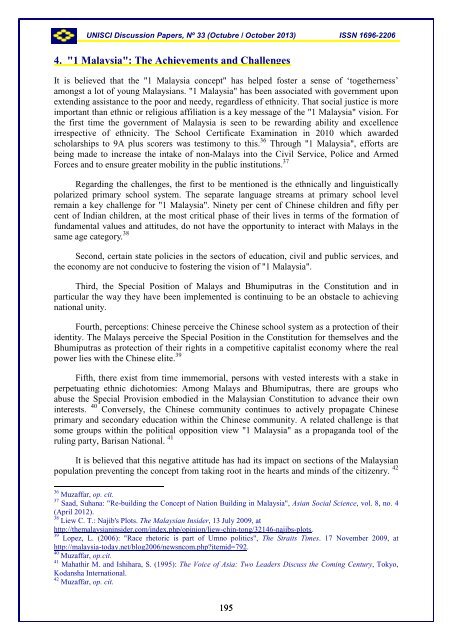UNISCI - Universidad Complutense de Madrid
UNISCI - Universidad Complutense de Madrid
UNISCI - Universidad Complutense de Madrid
You also want an ePaper? Increase the reach of your titles
YUMPU automatically turns print PDFs into web optimized ePapers that Google loves.
<strong>UNISCI</strong> Discussion Papers, Nº 33 (Octubre / October 2013) ISSN 1696-22064. "1 Malaysia": The Achievements and ChallengesIt is believed that the "1 Malaysia concept" has helped foster a sense of ‘togetherness’amongst a lot of young Malaysians. "1 Malaysia" has been associated with government uponextending assistance to the poor and needy, regardless of ethnicity. That social justice is moreimportant than ethnic or religious affiliation is a key message of the "1 Malaysia" vision. Forthe first time the government of Malaysia is seen to be rewarding ability and excellenceirrespective of ethnicity. The School Certificate Examination in 2010 which awar<strong>de</strong>dscholarships to 9A plus scorers was testimony to this. 36 Through "1 Malaysia", efforts arebeing ma<strong>de</strong> to increase the intake of non-Malays into the Civil Service, Police and ArmedForces and to ensure greater mobility in the public institutions. 37Regarding the challenges, the first to be mentioned is the ethnically and linguisticallypolarized primary school system. The separate language streams at primary school levelremain a key challenge for "1 Malaysia". Ninety per cent of Chinese children and fifty percent of Indian children, at the most critical phase of their lives in terms of the formation offundamental values and attitu<strong>de</strong>s, do not have the opportunity to interact with Malays in thesame age category. 38Second, certain state policies in the sectors of education, civil and public services, andthe economy are not conducive to fostering the vision of "1 Malaysia".Third, the Special Position of Malays and Bhumiputras in the Constitution and inparticular the way they have been implemented is continuing to be an obstacle to achievingnational unity.Fourth, perceptions: Chinese perceive the Chinese school system as a protection of theiri<strong>de</strong>ntity. The Malays perceive the Special Position in the Constitution for themselves and theBhumiputras as protection of their rights in a competitive capitalist economy where the realpower lies with the Chinese elite. 39Fifth, there exist from time immemorial, persons with vested interests with a stake inperpetuating ethnic dichotomies: Among Malays and Bhumiputras, there are groups whoabuse the Special Provision embodied in the Malaysian Constitution to advance their owninterests. 40 Conversely, the Chinese community continues to actively propagate Chineseprimary and secondary education within the Chinese community. A related challenge is thatsome groups within the political opposition view "1 Malaysia" as a propaganda tool of theruling party, Barisan National. 41It is believed that this negative attitu<strong>de</strong> has had its impact on sections of the Malaysianpopulation preventing the concept from taking root in the hearts and minds of the citizenry. 4236 Muzaffar, op. cit.37 Saad, Suhana: "Re-building the Concept of Nation Building in Malaysia", Asian Social Science, vol. 8, no. 4(April 2012).38 Liew C. T.: Najib's Plots. The Malaysian Insi<strong>de</strong>r, 13 July 2009, athttp://themalaysianinsi<strong>de</strong>r.com/in<strong>de</strong>x.php/opinion/liew-chin-tong/32146-najibs-plots.39 Lopez, L. (2006): "Race rhetoric is part of Umno politics", The Straits Times. 17 November 2009, athttp://malaysia-today.net/blog2006/newsncom.php?itemid=792.40 Muzaffar, op.cit.41 Mahathir M. and Ishihara, S. (1995): The Voice of Asia: Two Lea<strong>de</strong>rs Discuss the Coming Century, Tokyo,Kodansha International.42 Muzaffar, op. cit.195
















